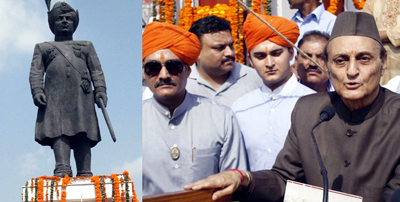
Excelsior Correspondent
JAMMU, Sept 23: Former Sadr-e-Riasat and top AICC leader Dr Karan Singh (MP) today said that massive floods and devastation in Kashmir was the outcome of environmental factors and blocking of natural water outlets by unplanned constructions.
While speaking at a function organised in connection with the 119th birth anniversary of Maharaja Hari Singh, the last Dogra ruler of the Jammu and Kashmir State at Samba Dr Singh said that recent floods in Kashmir and other parts and massive devastation is the outcome of environmental factors and blocking of natural outlets for construction of houses and other commercial establishments. He said such a flood had occurred in 1903 and now after 111 years, it has brought massive destruction in the Valley. While expressing his deep anguish at the massive loss of lives and property during the floods, Dr Singh conveyed his deep sympathy to the bereaved families.
The AICC leader also commended the remarkable work of Army, Air Force and NDRF in rescuing lakhs of flood affected people. He also lauded the work of local Shikara Wallas and youth organizations who worked round the clock to save precious lives and property. Dr Singh said that the massive relief and rehabilitation process needs to be urgently and effectively implemented by all concerned agencies. This has been the national disaster and needs to be tackled on war footing, Dr Singh maintained.
Referring to the great achievements made during the regime of Maharaja Hari Singh, Dr Karan Singh highlighted his role as social reformer by abolishing beggary, opening of temples for Dalits, eradicating the prejudice against agricultural Rajputs by taking the plough himself. He also referred to several other works like construction of hospitals and colleges in Srinagar and Jammu, Boulevard Road Srinagar etc.
Dr Singh was accompanied by his son, Vikramaditya Singh and grandson Martand Singh at the function held at Veer Bhumi Park, Samba by Amar Kshatriya Rajput Sabha.
Another function was held at the main Tawi bridge by Rajput Sabha where rich tributes were paid to the great Dogra ruler by Dr Karan Singh, Dr Nirmal Singh (Sr BJP leader), Ashok Khajuria MLA, Maj Gen G S Jamwal, Maj Gen R S Jamwal, Retd Judge Pavitar Singh, president Rajput Sabha Narayan Singh and others.
Dr Singh recalled the contributions of Maharaja and said that the great ruler had dedicated his life for the services of the people of this State. A network of road connectivity and bridges were constructed by Maharaja Hari Singh to give boost to trade and commerce in the State. He constructed three main hospitals with ultra modern equipment in Srinagar and Jammu. To stop menace of flood, several flood control works were undertaken. Industrial Board was established and industrial exhibitions were arranged at Tehsil level. Mining resources of the State were exploited during his reign. He banned the child marriage and smoking among children by enacting laws and favoured widow re-marriage. He enacted through a communiqué the hereditary State Subject Law and established a High Court on the pattern of British India. The Late Maharja created a political awakening among his people by establishing a Praja Sabha of both elected and nominated members. He was the founder of J&K Bank. Maharaja Hari Singh was the first ruler of J&K State among 560 rulers who supported the cause of India’s freedom at the First Round Table Conference held in London in November 1930.
Meanwhile, District Congress Seva Dal Samba also organised function in which Seva Dal chief B S Sambyal was the chief guest. The speakers paid tributes to Maharaja Hari Singh. They recalled the services of Late Maharaja. Shri Kailakh Jyotish Ave, Vedic Sansthan Trust also organised a function at Ban Talab and paid tributes to Maharaja Hari Singh. Rohit Shastri, president of the Trust presided over the function.

